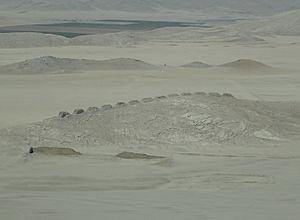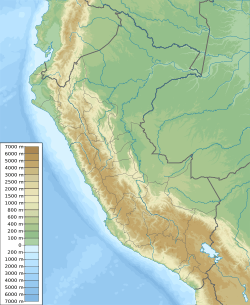Chanquillo facts for kids

Thirteen Towers of Chankillo, viewed from the fortress
|
|
| Alternative name | Chankillo |
|---|---|
| Location | Ancash Region, Peru |
| Coordinates | 09°33′24″S 78°14′09″W / 9.55667°S 78.23583°W |
| Type | Fortified sanctuary |
| Part of | Casma/Sechin culture |
| Area | 4 km2 (1.5 sq mi) |
| History | |
| Founded | 300 BC |
| Official name | Chankillo Archaeoastronomical Complex |
| Criteria | Cultural: (i)(iv) |
| Designated | 2021 (44th session) |
| Reference no. | 1624 |
Chanquillo, also known as Chankillo, is an amazing ancient place in the desert of Peru. It is located in the Casma-Sechin area of the Ancash Department. This large site includes a fort on a hilltop and a special solar observatory called the Thirteen Towers. There are also areas where people used to live and gather.
Scientists believe the Thirteen Towers were built around 300 BC. They think it was used to study the sun and stars. The people who built Chanquillo belonged to the Casma/Sechin culture. In July 2021, UNESCO named Chanquillo a World Heritage Site. This means it is a very important place for everyone to protect. The entire site covers about four square kilometers (1.5 square miles). It is thought to have been a fortified temple, meaning it was a religious place with strong defenses.
Contents
The Thirteen Towers: An Ancient Observatory
The Thirteen Towers of Chanquillo are lined up on a low hill. They run from near north to south, creating a "toothed" shape against the sky. There are small gaps between the towers. From two special spots, one to the east and one to the west, people could watch the sun.
How the Towers Tracked the Sun
The towers are spread out over 300 meters (about 984 feet). This distance perfectly matches where the sun rises and sets throughout the year. On the shortest day of the year (winter solstice), the sun would rise behind the tower on the far left. As the year went on, the sun would appear to move. It would rise behind each tower until it reached the tower on the far right. This happened six months later, on the longest day of the year (summer solstice). This system helped people keep track of the days and seasons.
Why Chanquillo is Special
The Thirteen Towers of Chanquillo might be the oldest known observatory in all of the Americas. The people living there could figure out the exact date, usually within a day or two. They did this just by watching the sunrise or sunset from the correct tower. This was a very clever way to tell time in ancient days. For a long time, travelers knew about the towers. But it wasn't until 2007 that experts Iván Ghezzi and Clive Ruggles figured out they were an astronomical site.
See also
 In Spanish: Chankillo para niños
In Spanish: Chankillo para niños
- Acaray
- List of archaeoastronomical sites by country
Images for kids


